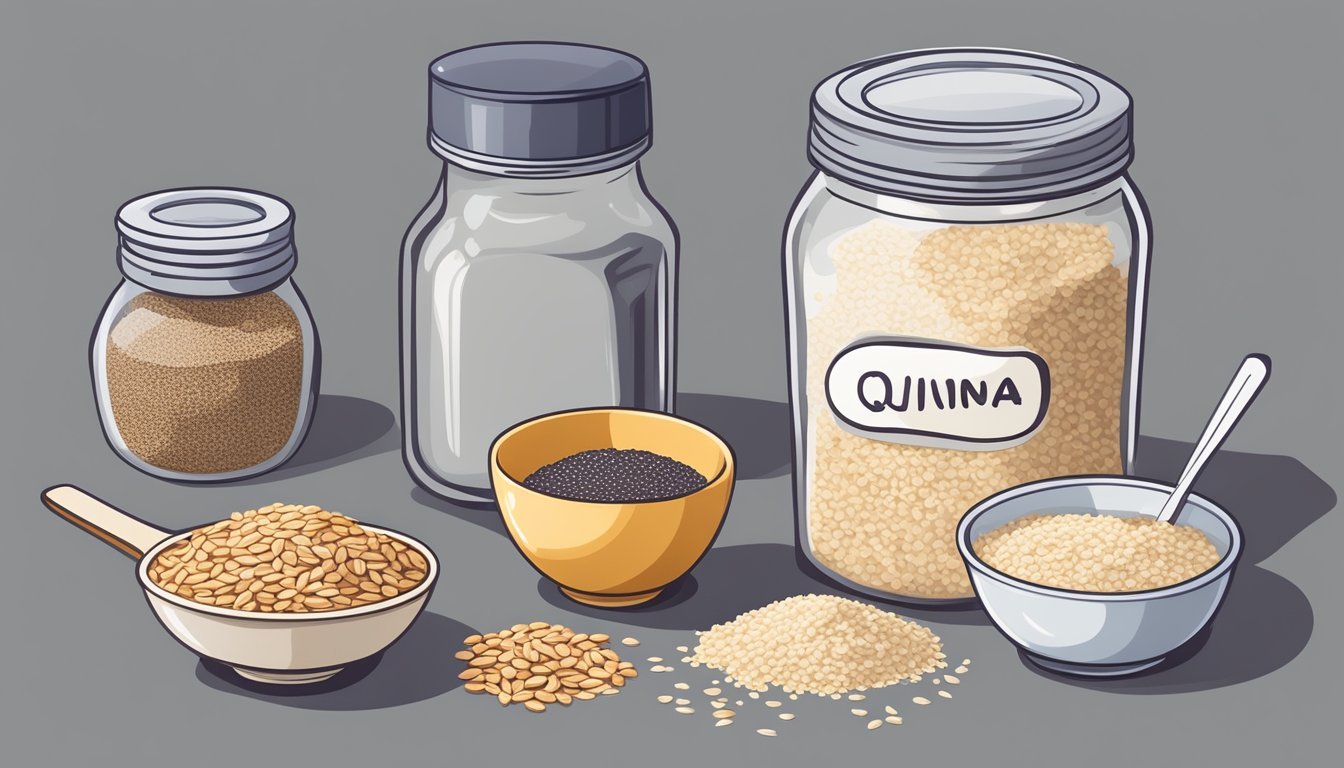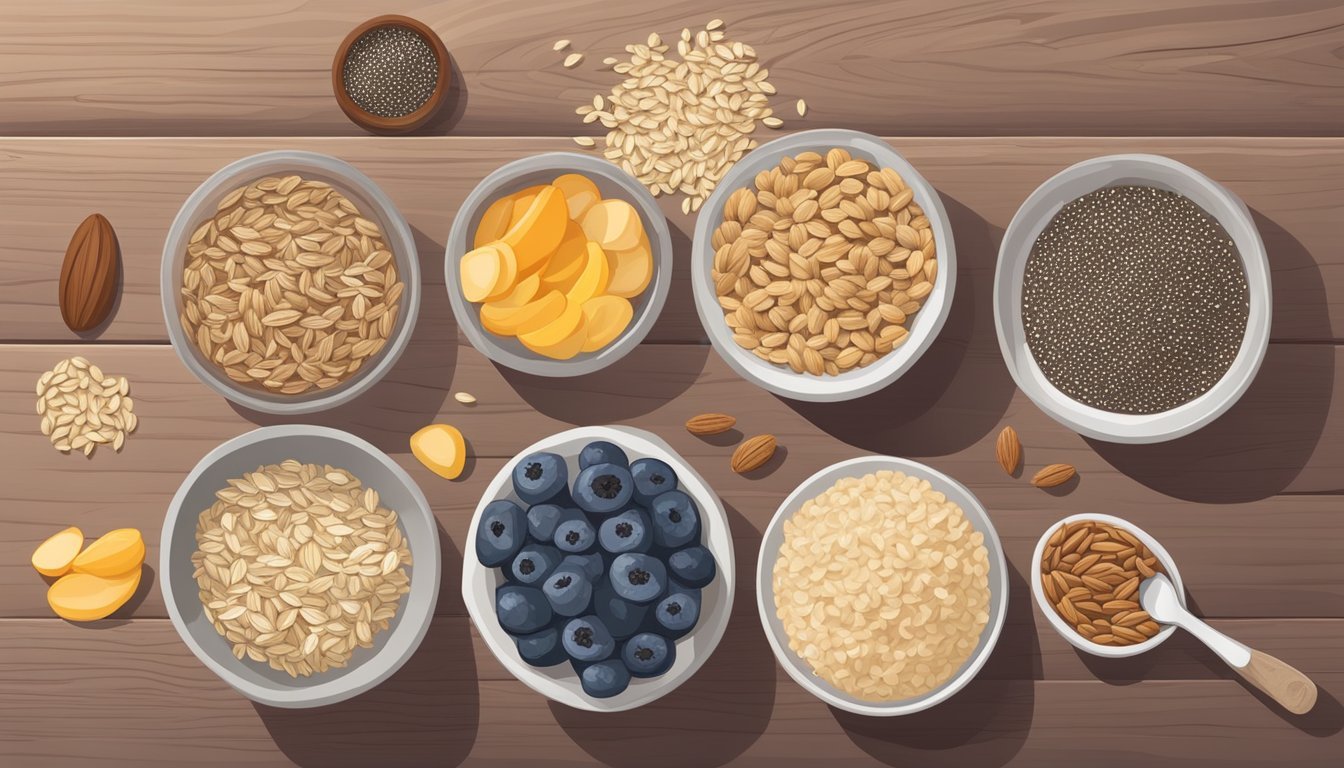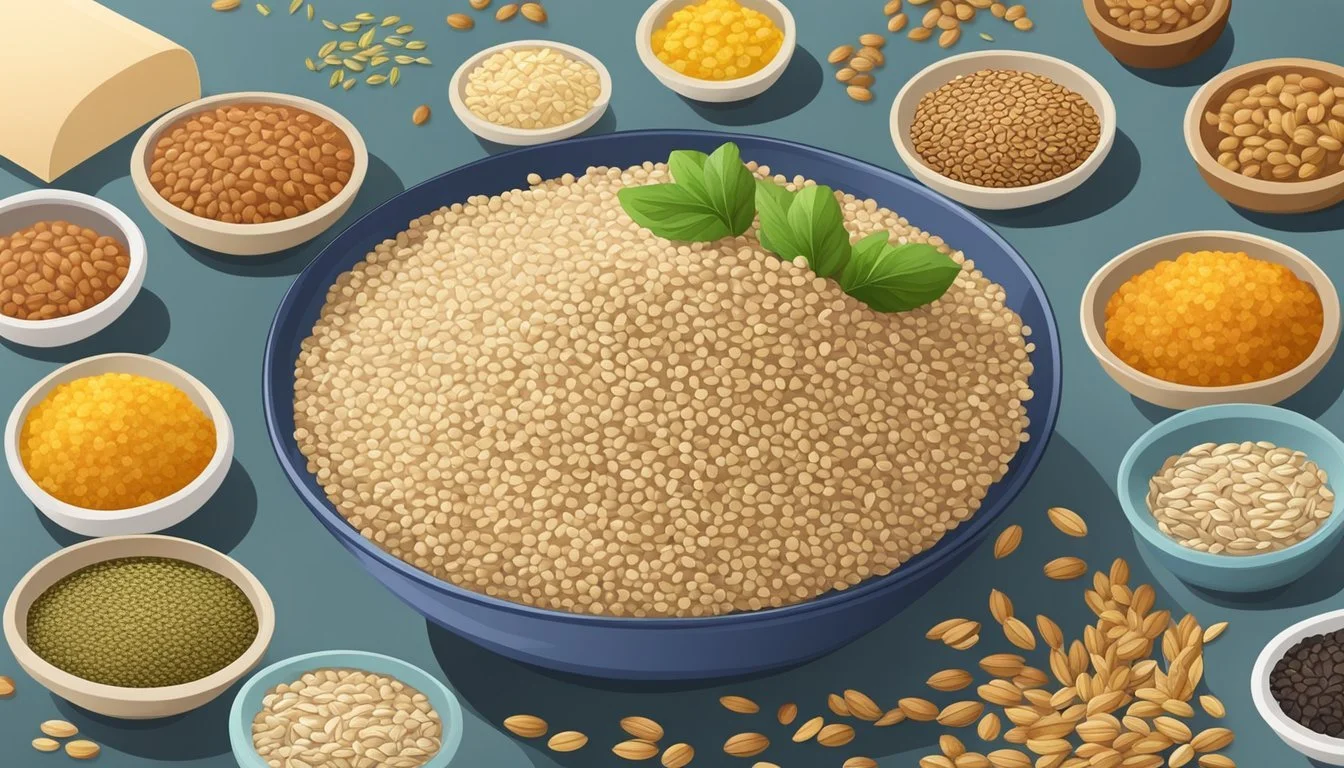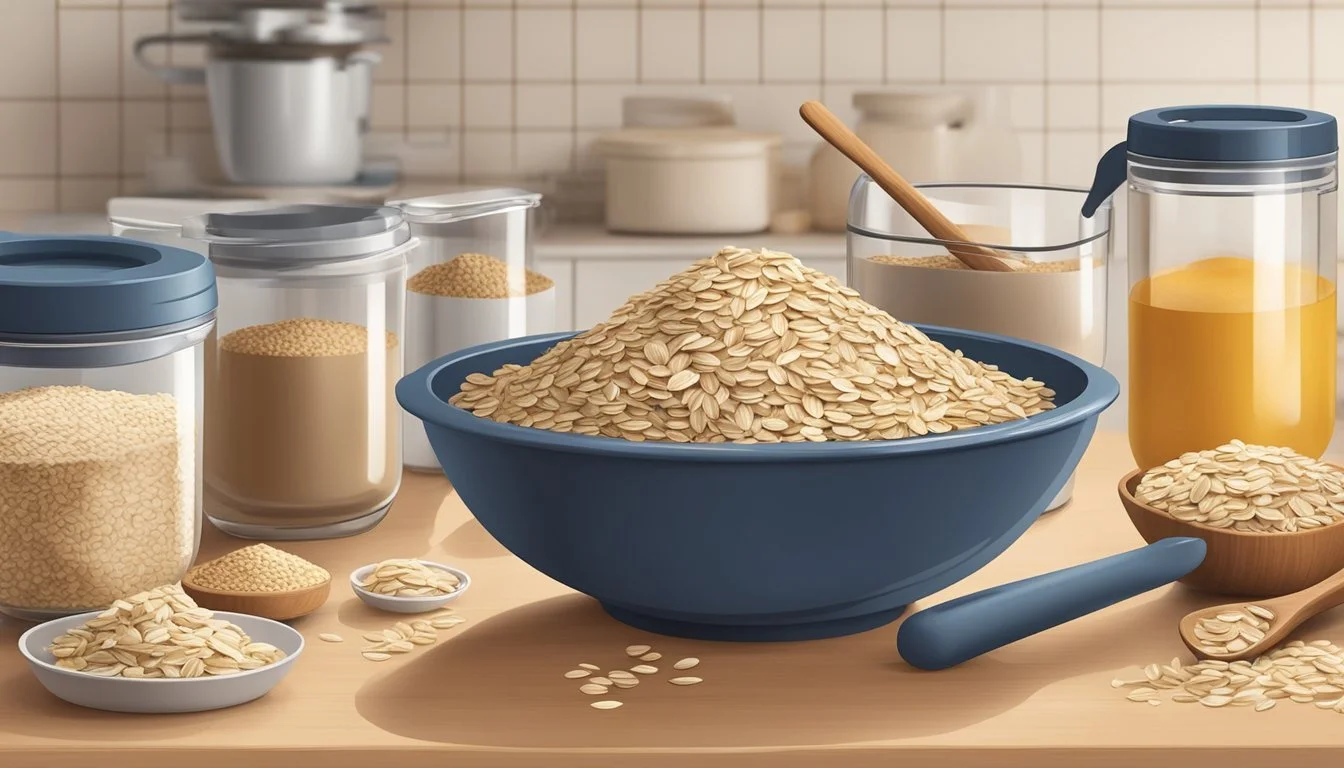Rolled Oats Substitutes
Top Alternatives for Healthy Cooking
Choosing the right substitute for rolled oats can enhance not only the nutritional profile of your dishes but also accommodate dietary restrictions and taste preferences. Quinoa flakes, a protein-rich alternative, cook quickly and offer a similar texture to rolled oats. For those who enjoy earthy flavors, amaranth provides a nutrient-dense option filled with protein and fiber.
Among the array of substitutes, buckwheat stands out due to its high manganese and magnesium content, along with essential B vitamins. These alternatives, including millet and rice flakes, don't just serve your diet but also add varied textures and flavors to your meals. Making an informed choice about which substitute to choose can transform your usual oat-based recipes into something uniquely nutritious and delicious.
Understanding Rolled Oats
Rolled oats are a popular ingredient due to their versatility in various dishes and their robust nutritional profile, including vital vitamins, minerals, and fiber. Their benefits extend to both cooking and baking, making them an essential pantry staple.
Nutritional Profile
Rolled oats are rich in essential nutrients. They provide a substantial amount of fiber, particularly beta-glucan, which has been shown to help lower cholesterol levels. Protein content in oats also supports muscle health and satiety.
In addition to fiber and protein, rolled oats are packed with important vitamins and minerals. They are a good source of iron, which is crucial for oxygen transport in the blood. Furthermore, oats offer magnesium, zinc, and several B vitamins.
Rolled oats are naturally gluten-free, but they can be cross-contaminated with gluten during processing. Therefore, it’s important for those with gluten sensitivities to seek certified gluten-free varieties.
Common Uses in Cooking and Baking
Rolled oats are incredibly versatile in the kitchen. They are most commonly used to make oatmeal or porridge, which is a comforting breakfast option. They absorb liquid well, making them ideal for hot cereals.
In baking, rolled oats add texture and nutrition to items like cookies, muffins, and granola bars. Their ability to hold moisture helps keep baked goods tender. Rolled oats can also be used as a binding agent in recipes such as meatloaf or meatballs.
For those looking to incorporate oats into their diet in creative ways, they can be blended into smoothies, sprinkled over yogurt, or even used as a breading for proteins.
Reasons for Substituting Rolled Oats
Substituting rolled oats can be driven by various factors such as dietary restrictions, specific texture and flavor preferences, and the desire to add variety to one's diet.
Dietary Restrictions
People with certain dietary restrictions may need to find alternatives to rolled oats. Those with celiac disease or gluten intolerance must avoid gluten, leading them to choose options like quinoa flakes or buckwheat.
Allergies to grains can also necessitate substitutes, such as amaranth, a gluten-free ancient grain high in protein and fiber. These replacements ensure nutritional needs are met without compromising health.
Texture and Flavor Preferences
Texture and flavor preferences greatly influence the choice of oat substitutes. Some may prefer the earthy taste of amaranth or the nutty flavor of quinoa flakes over rolled oats.
Rice flakes provide a comforting, familiar texture, especially for those unaccustomed to the chewy consistency of traditional oats. These alternatives offer varied sensory experiences, catering to individual tastes.
Variety in Diet
Introducing variety into a diet is another reason for seeking oat substitutes. Quinoa flakes, amaranth, and rice cream are examples of diverse options that can add nutritional variance and prevent boredom with routine meals.
Different grains and seeds can enrich one's diet with distinct flavors and textures. This diversification can be particularly beneficial in maintaining a balanced diet by incorporating various nutrient profiles.
Nutritionally Equivalent Substitutes
When searching for substitutes for rolled oats, focusing on options that closely match their nutritional profile is essential. Quinoa flakes, amaranth, and buckwheat groats are three excellent alternatives that provide similar benefits in terms of protein, fiber, and essential nutrients.
Quinoa Flakes
Quinoa flakes are a highly nutritious alternative to rolled oats. They are derived from quinoa, a complete protein that contains all nine essential amino acids. Quinoa flakes offer a substantial amount of fiber, which aids digestion and maintains a feeling of fullness.
One of the highlights of quinoa flakes is their mineral content. They are rich in iron and magnesium, both of which play crucial roles in energy production and muscle function. Quinoa flakes are also gluten-free, making them a suitable choice for those with gluten sensitivities or celiac disease.
Incorporating quinoa flakes into meals is straightforward. They can be used in place of rolled oats in breakfast dishes, baked goods, and even as a thickening agent in soups. Their mild flavor and versatile nature make them a valuable addition to any diet.
Amaranth
Amaranth is another excellent rolled oats substitute that boasts a high protein content. Like quinoa, amaranth is considered a complete protein, offering all essential amino acids. This makes it particularly beneficial for vegetarians and those seeking plant-based protein sources.
Amaranth is rich in fiber, contributing to digestive health and offering a longer-lasting sense of fullness. It is also packed with B vitamins, which are crucial for energy metabolism and maintaining healthy skin and nerves. Additionally, amaranth provides essential minerals, including iron and magnesium.
Using amaranth in recipes is simple. It can be cooked similarly to rice or added to baked goods. Its slightly nutty flavor adds depth to dishes, making it a versatile ingredient in both sweet and savory meals. As a whole grain, amaranth is not only nutritious but also enhances the overall texture and flavor of the dish.
Buckwheat Groats
Buckwheat groats are a gluten-free alternative to rolled oats that are packed with nutrients. They are an excellent source of fiber, promoting healthy digestion and helping to stabilize blood sugar levels. Protein content in buckwheat groats is also robust, supporting muscle growth and repair.
One of the standout features of buckwheat groats is their high mineral content. They are rich in magnesium, which supports cardiovascular health and helps relaxation, and iron, crucial for preventing anemia. They also contain B vitamins, essential for energy production.
Incorporating buckwheat groats into your diet is quite flexible. They can be used in porridge, salads, or as a rice substitute. Their earthy flavor adds a unique taste to dishes, making them a nutritious and flavorful addition to various meals. Being a whole grain, buckwheat groats offer numerous health benefits while being versatile in the kitchen.
Alternatives for Specific Uses
Exploring substitutes for rolled oats requires a focus on the specific use cases in which they excel. Different alternatives shine in baking, cooking porridge, and making granola or no-bake recipes.
Baking with Oat Flour and Almond Meal
For baking, oat flour and almond meal are notable substitutes. Oat flour provides a similar texture and mild flavor, making it ideal for cookies, muffins, and other baked goods. It's naturally gluten-free and retains the nutritional benefits of whole oats.
Almond meal offers a nutty flavor and high moisture content, suitable for soft and dense baked items. It works well in combination with other flours to create a balanced texture and robust flavor. Using almond meal in baking can add healthy fats, protein, and a pleasantly rich taste.
Porridge with Millet and Rice Flakes
Millet and rice flakes serve as excellent bases for porridge. Millet has a subtle, slightly sweet flavor and cooks to a creamy consistency, making it a satisfying and nutritious option for breakfast. It's rich in magnesium and phosphorus, contributing to a well-rounded meal.
Rice flakes, particularly in gluten-free diets, offer a soft and mild alternative to traditional oats. Their neutral taste pairs well with various toppings and flavors, from sweet fruits to savory spices. They cook quickly, making them a convenient choice for busy mornings.
Granola and No-Bake Recipes
In granola and no-bake recipes, numerous alternatives shine. Buckwheat, despite its name, is gluten-free and provides a crunchy texture for granola, enhancing the nutritional content with its high fiber and magnesium levels.
For no-bake recipes, coconut flakes add a tropical twist. They are lower in carbohydrates and higher in healthy fats compared to rolled oats, making them ideal for energy bars and bite-sized snacks. Combining coconut flakes with other ingredients can create flavor-rich, nutrient-dense snacks without the need for baking.
Quinoa flakes are another versatile option, offering a protein-rich alternative for both granola and no-bake recipes. They blend well with nuts, seeds, and dried fruits, adding a unique texture and enhancing the overall nutritional profile.
Quick and Easy Substitutes
There are several quick and easy substitutes for rolled oats that can fit into various dietary needs and preferences. These options range from different types of oats to seeds that provide comparable nutritional benefits.
Instant Oats and Quick Oats
Instant oats and quick oats are excellent substitutes for rolled oats. They cook in a fraction of the time. Instant oats are pre-cooked and then dried, making them the fastest option. Just add hot water or microwave for about one minute, and they’re ready.
Quick oats cook similarly to instant oats but are less processed, retaining slightly more texture. They take approximately 1-2 minutes on the stovetop. Both varieties are gluten-free and offer fiber and essential nutrients, supporting heart health.
Steel-Cut Oats
Steel-cut oats are another alternative but require more cooking time compared to quick oats and instant oats. They are chopped whole oat groats, which gives them a chewier texture. Cooking typically takes around 20-30 minutes.
Despite the longer preparation, steel-cut oats are rich in fiber and have a lower glycemic index, making them ideal for those managing blood sugar levels. They are also gluten-free and provide a hearty, nutrient-dense meal.
Chia Seeds and Flaxseeds
For those seeking a non-oat substitute, chia seeds and flaxseeds are excellent choices. Both offer healthy fats and omega-3 fatty acids, promoting heart health. They are also gluten-free and can create a porridge-like consistency when mixed with water or milk.
Chia seeds absorb liquid and expand, forming a gel-like texture. They are ready to eat after soaking for about 15 minutes. Flaxseeds need to be ground to maximize nutrient absorption and can be mixed into smoothies or yogurt for a quick meal. Both seeds are high in fiber, contributing to digestive health and satiety.
Creative Substitutes for Rolled Oats
Many alternatives to rolled oats offer diverse textures and flavors while providing essential nutrients. These substitutes include exotic ingredients like puffed quinoa and coconut flakes, nut-based options such as almond meal, and nutritious seed mixes.
Exotic Choices: Puffed Quinoa and Coconut Flakes
Puffed quinoa serves as a light and airy replacement for rolled oats. It is high in protein and contains essential minerals like magnesium and phosphorus. Its crisp texture makes it perfect for granolas and snack bars.
Coconut flakes add a tropical twist to recipes. They provide healthy fats and are rich in dietary fiber. When used alongside other ingredients, they contribute a satisfying crunch and subtle sweetness.
Nut-based Options: Almond Meal and Flour Blend
Almond meal is a gluten-free alternative that introduces a nutty flavor to dishes. It is high in protein and contains healthy fats, making it suitable for baking applications like cookies and muffins. The fine texture of almond meal ensures it integrates smoothly into most recipes.
A blend of almond flour with other gluten-free flours can mimic the consistency of oats. This blend can include quinoa flour or coconut flour, enhancing the nutritional profile with added protein and fiber. Each flour contributes distinct flavors, enriching the overall taste of the dish.
Seed Mixes for Added Nutrition
Combining seeds such as chia, flax, and hemp creates a powerful mix of nutrients. These seeds are excellent sources of dietary fiber, plant-based protein, and antioxidants. Chia seeds, in particular, absorb liquid and swell, which can mimic the texture of cooked oats.
Flax seeds bring omega-3 fatty acids and additional fiber, while hemp seeds offer complete protein. Using a variety of seeds not only boosts nutritional content but also introduces different textures and flavors, making for a versatile and healthy oatmeal alternative.
Cooking and Baking Considerations
When substituting rolled oats, there are several factors to consider, including adjusting liquid content and ratios, modifying cooking times, and achieving the right texture and consistency.
Adjusting Liquid Content and Ratios
Substitutes may absorb liquid differently than rolled oats. Quick oats, for example, absorb more liquid and might require more water or milk. Quinoa or amaranth could need at least a 1:2 ratio of grain to liquid. This means, if using one cup of these substitutes, at least two cups of liquid might be necessary.
It's essential to monitor the liquid content closely since deviations can affect the consistency, making the dish too dry or too mushy. When using flour and almond meal as substitutes, mixing in the right amount of liquid might prevent dryness in baking.
Modifying Cooking Times
Different substitutes require varying cooking times. Quick oats cook faster than rolled oats, typically within 1-2 minutes on the stovetop. Rice and quinoa might take longer, often around 15-20 minutes, to reach a comparable texture.
When baking, the blend of flour and almond meal might need a shorter cooking time to avoid drying out the dish. Always check for doneness earlier than the original recipe suggests.
Texture and Consistency Adjustments
Achieving the right texture matters, especially for dishes like smoothies, salads, and both sweet and savory dishes. Quick oats deliver a softer, more homogeneous texture, enhancing smoothies with a smooth consistency. Millet and amaranth can offer a slightly chewy texture, suitable for adding a bit of bite in salads.
Understanding how each substitute impacts texture ensures that the final dish meets the desired mouthfeel and that the digestive system finds it easy to process. Monitoring and adjusting cooking methods can achieve the closest match to rolled oats while respecting the distinct properties of each substitute.
Health and Lifestyle Benefits
Exploring rolled oats substitutes can lead to significant health and lifestyle benefits. These alternatives can aid in weight loss, cater to those with celiac disease or allergies, and support muscle repair and growth.
Whole Grain Substitutes for Weight Loss
Whole grain substitutes like amaranth and quinoa are excellent for weight loss. Amaranth is high in fiber, which helps regulate the digestive system and maintain a feeling of fullness. Quinoa, another whole grain, is rich in protein, promoting satiety and reducing overall calorie intake.
Both grains have a low glycemic index, which helps maintain stable blood sugar levels. This can prevent spikes in hunger and cravings. Including these whole grains in a diet can support sustained weight loss efforts while providing essential nutrients like calcium and potassium.
Gluten-Free Alternatives for Celiac and Allergies
For individuals with celiac disease or gluten allergies, finding substitutes for rolled oats is crucial. Alternatives such as amaranth and quinoa are naturally gluten-free and safe for these individuals. Amaranth is also rich in iron and calcium, supporting overall health despite dietary restrictions.
These gluten-free grains offer essential nutrients without causing adverse reactions. They support a balanced diet, providing fiber and other critical vitamins and minerals. Substituting gluten-free grains for rolled oats ensures those with celiac or gluten sensitivities can enjoy their meals without compromising their health.
Superfoods for Muscle Repair and Growth
Superfoods like quinoa are beneficial for muscle repair and growth due to their high protein content. Protein is essential for building and repairing muscle tissues, making quinoa an excellent choice for athletes and those engaged in regular exercise.
Quinoa also contains important amino acids and nutrients like magnesium and iron, which are crucial for muscle function and recovery. Including quinoa in meals can help enhance muscle repair processes, support growth, and improve overall physical performance. This makes it a valuable addition to the diet of anyone looking to boost their muscle health.








